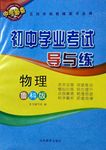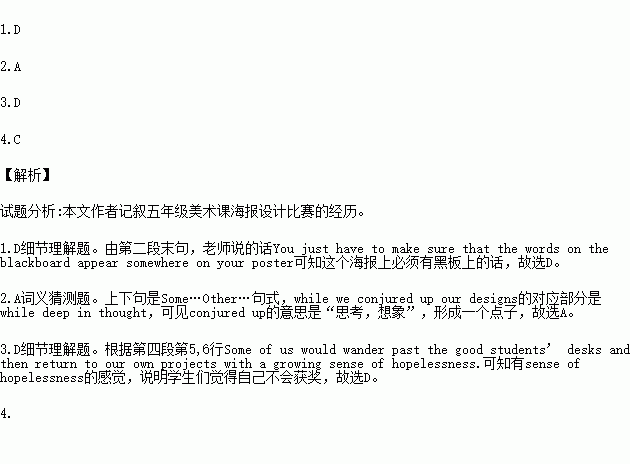题目内容
We once had a poster competition in our fifth grade art class.
“You could win prizes,’’ our teacher told us as she wrote the poster information on the blackboard. She passed out sheets of construction paper while continuing, “The first prize is ten dollars. You just have to make sure that the words on the blackboard appear somewhere on your poster.”
We studied the board critically. Some of us looked with one eye and held up certain colors against the blackboard, rocking the sheets to the right or left while we conjured up our designs. Others twisted their hair around their fingers or chewed their erasers while deep in thought. We had plans for that ten-dollar grand prize, each and every one of us. I’m going to spend mine on candies, one hopeful would announce, while another practiced looking serious, wise and rich.
Everyone in the class made a poster. Some of us used parts of those fancy paper napkins, while others used nothing but colored construction paper. Some of us used big designs, and some of us preferred to gather our art tidily down in one corner of our poster and let the space draw the viewer’s attention to it. Some of us would wander past the good students’ desks and then return to our own projects with a growing sense of hopelessness. It was yet another grown-up trick of the sort they seemed especially fond of, making all of us believe we had a fair chance, and then always — always — rewarding the same old winners.
I believe I drew a sailboat, but I can’t say that with any certainty. I made it. I admired it. I determined it to be the very best of all of the posters I had seen, and then I turned it in.
Minutes passed.
No one came along to give me the grand prize, and then someone distracted me, and I probably never would have thought about that poster again.
I was still sitting at my desk, thinking, What poster? when the teacher gave me an envelope with a ten-dollar bill in it and everyone in the class applauded for me.
1.What was the teacher’s requirement for the poster?
A. It must appear in time.
B. It must be done in class.
C. It must be done on a construction sheet.
D. It must include the words on the blackboard.
2.The underlined phrase in paragraph 3 most probably means ________.
A. formed an idea for
B. made an outline for
C. made some space for
D. chose some colors for
3.After seeing the good students’ designs, some students ________.
A. loved their own designs more
B. thought they had a fair chance
C. put their own designs in a corner
D. thought they would not win the prize
4.We can infer from the passage that the author ________.
A. enjoyed grown-up tricks very much
B. loved poster competitions very much
C. felt surprised to win the competition
D. became wise and rich after the competition
 初中学业考试导与练系列答案
初中学业考试导与练系列答案
